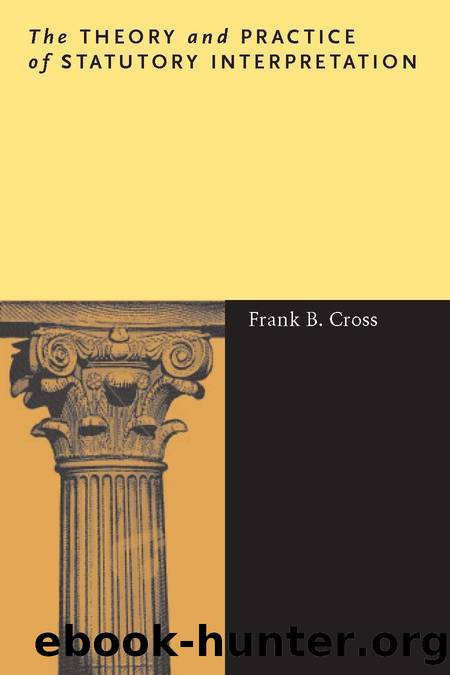The Theory and Practice of Statutory Interpretation by Frank B. Cross

Author:Frank B. Cross
Language: eng
Format: epub
Publisher: Stanford University Press
Published: 2011-07-27T00:00:00+00:00
The Absurdity Doctrine
By its nature, pragmatism seldom fits within the dogma of legal doctrines. Pragmatism is fundamentally a circumstantial, rather than rigidly doctrinal, approach to adjudicative decision making. Pragmatic considerations are occasionally captured in doctrinal authority, though, and the most obvious of these in the context of statutory interpretation is known as the âabsurdityâ doctrine of statutory interpretation. This principle simply states that laws will not be interpreted in a fashion so as to yield absurd results, even when the text superficially seems to command such an interpretation. Lon Fuller observed that it is plainly apparent that when the master tells the housemaid âto âdrop everything and come runningâ he has overlooked the possibility that she is at the moment in the act of rescuing the baby from the rain barrel.â21 In the statutory context, this would mean that a statute making it a crime to âspill blood on the streetâ should not be applied to a âphysician doing emergency surgery at the scene of an accident.â 22 Most findings of absurdity are not so dramatic, and its application is usually an assessment of the âreasonableness, rationality, and common senseâ of an interpretation.23
Significantly, advocates of virtually all theories of statutory interpretation accept the validity of the absurdity doctrine. The doctrine is consistent with the theory of delegation of judgment to the courts. Absurd results may well only reflect the unforeseen circumstances that result in the background delegation. The absurdity doctrine is most comfortably consistent with pragmatism. Intentionalists have embraced the doctrine on the grounds that the legislature would surely not intend to create absurd results. The very core of formalistic textualist theories, by contrast, seemingly rejects the judicial discretion implicit in the absurdity doctrine, though textualists such as Justice Scalia are untroubled by the doctrine.
The absurdity doctrine turns some of the arguments for textualism on their heads. For example, textualists have suggested that the legislative process might be improved if judges limited their consideration to text. Conversely, the judicial process might be improved if judges could less easily evade responsibility by deference to text or other legislative materials. W. David Slawson suggests that judges âare increasingly reluctant to accept responsibility for making difficult policy decisions or to offer reasoned justificationsâ and therefore may rely on legislative history to âdeflect responsibility onto past Congresses.â24 By using tools like legislative history or text, judges can generally save time and effort, as well as evading responsibility. The absurdity doctrine, though, is contrary to this concern; it shows a judiciary assuming responsibility for righting a bad statute. It is the essence of pragmatic judging and the real question is how constrained the theory should be.
While textualists have universally not rejected the absurdity doctrine, they necessarily have some unease with its principles, and John Manning has directly criticized the approach. The legal process schoolâs view of interpretation sought to apply statutes from the perspective of a âreasonable policymaker.â It questioned how a reasonable policymaker would apply given language. A prominent textualist like John Manning rejects
Download
This site does not store any files on its server. We only index and link to content provided by other sites. Please contact the content providers to delete copyright contents if any and email us, we'll remove relevant links or contents immediately.
American Kingpin by Nick Bilton(3872)
Future Crimes by Marc Goodman(3591)
The Meaning of the Library by unknow(2563)
Inside the Middle East by Avi Melamed(2348)
Why Nations Fail: The Origins of Power, Prosperity, and Poverty by Daron Acemoglu & James Robinson(2281)
On Tyranny by Timothy Snyder(2227)
Living Silence in Burma by Christina Fink(2059)
Putin's Labyrinth(2015)
The Mastermind by Evan Ratliff(1932)
The Smartest Kids in the World by Amanda Ripley(1843)
Think Like a Rocket Scientist by Ozan Varol(1812)
Law: A Very Short Introduction by Raymond Wacks(1736)
It's Our Turn to Eat by Michela Wrong(1719)
The Rule of Law by Bingham Tom(1686)
Philosophy of law a very short introduction by Raymond Wacks(1654)
Leadership by Doris Kearns Goodwin(1632)
A Dirty War by Anna Politkovskaya(1612)
Information and Communications Security by Jianying Zhou & Xiapu Luo & Qingni Shen & Zhen Xu(1611)
Civil Procedure (Aspen Casebooks) by Stephen C. Yeazell(1541)
